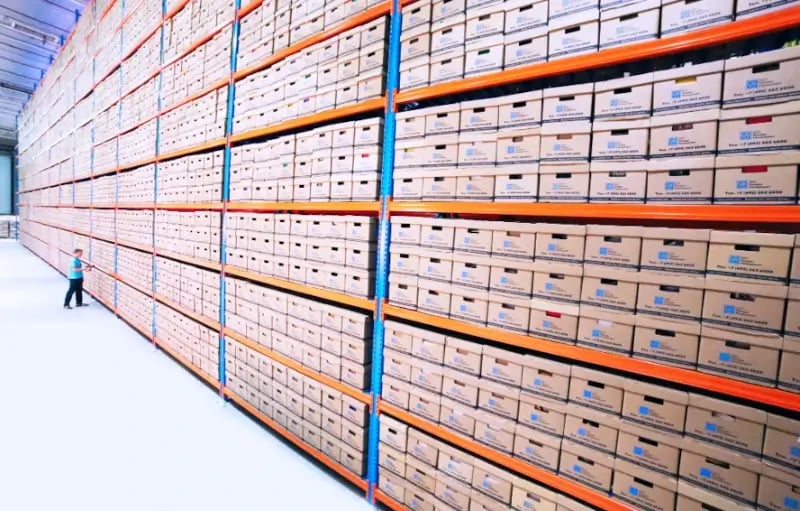4 must-have features of a document management system
Document management systems are the digital equivalent of the trusty printer in most businesses. They aren’t flashy; you might grumble whenever you have to work with them, but they’re absolutely essential to the vast majority of businesses.
Think about how many documents are created each day by your business and others around the world, and consider the administrative challenge of keeping all that data organized and ready to be recalled on demand. It’s no small feat and can seem impossible at times. When done through a Document Management System (DMS), however, it becomes straightforward and accessible to all.
But what makes the difference between a quality document management system and one that you should avoid? We’ve tallied our most valued features of any DMS and outlined them below so you know what to look for when researching your next upgrade.

What is a document management system?
A Document Management System (DMS) is a digital repository, typically a purchased standalone software or a subscription-based software platform, that catalogs and stores documents across all areas of a business. Some are singular tools, providing the specific functionality your business needs, while others may come as part of a wider feature suite—this can be handy for smaller businesses, where a greater number of features can be more cost-effective.
There is no limit to the type of electronic document that can be stored, which makes it incredibly versatile for businesses of all types, and most will have large storage volumes or flexible storage options to allow for scalability as a business grows. By incorporating data warehousing principles, businesses can optimize the storage and retrieval of vast amounts of information, enabling rich data analysis to further business plans.

Benefits of a document management system
Investing in a robust DMS for your business is a must for any growing business to maintain consistency and accountancy for its growing information stack. Some of the main benefits of using a DMS as your information management solution include:
- Cost-effective storage
Although there will be a real-world cost associated with purchasing or subscribing to a modern document management system, the time your business can reclaim from automating the storage and organization of a vast document stack cannot be understated.
- Scaleable
As your business grows, it’s important always to review your technology portfolio and ensure it supports your ambitions. Given that high-quality document management systems are only limited by the available storage space given to them, many providers will allow for the on-demand adjustment of storage requirements to support your operations.
- Customizable behavior
As a DMS operates through rules-based automated filing of documents, you have a vast amount of choice in how you customize your DMS environment. No matter how you want to utilize your DMS and structure your document hierarchy, modern platforms will support your plans and give you the control to structure it as you see fit.
- Paperless environment
As businesses move to a digital-only environment, a DMS is the beating heart of such an endeavor. By placing all your documents and files into a digital location accessible by your team, whether they are working remotely or on-site, you will benefit from a greener way of working and reduce paper usage by a marked amount.

Important features for a document management system
Each DMS will come with a host of unique features to entice customers and edge out fierce competition. However, many features will come as standard across the majority of offerings. For example, every DMS is going to be capable of storing important data, such as client details, for those signed up for an online telephone service, but not every DMS will operate from the cloud.
The needs of each business are different, so some of the features we outline may be more valuable for you than others, and it’s important to outline what might be important to your business operations and seek a document management system that fits those needs.
Search functionality
A powerful search function is an integral pillar of any quality DMS. Fast-moving businesses require on-demand access to files, meaning that a search function unable to keep up with a growing database will simply not be sufficient. If your web development business has thousands of records to peruse through and you need to find all accounts registered to specific domain names, a search function can make this a simple task.
Furthermore, it’s important to test a search function if providers offer a trial period of the software. Measure the speed and accuracy of various types of searches, as lost time waiting for the DMS to crunch through databases translates to business costs that you won’t want to take on.
Keep in mind that effective search functionality will rely on effective document metadata management and categorization features.
Document categorization features
Most document management systems will rely on tagging, rating, and various categorization techniques to allow for in-depth management of fresh documents. This information, when attached to a document, will allow for a more complex file hierarchy to appear, with options for dynamic categories, file types, and filtering by age, among many other categories, available for individuals.
The ability to structure your data robustly and logically, often autonomously through the use of rules-based tagging, can save your business huge amounts of administration time. It can also help to ensure a consistent process for all storage of documentation.

Cloud access
For modern businesses that operate with employees across the globe remotely or for any multi-site operations, cloud access to the DMS is an absolute must. This simple feature is all but mandatory for growing companies, as documents need to be readily accessible from anywhere.
Whether you need to pull up a contract at a client’s premises or need to prepare documentation for remote team members to access, cloud access will be a fantastic addition. The additional flexibility for your entire team to engage with your documents at a global scale will pay dividends if your business operates internationally. While you might need multiple websites to operate abroad (each with a localized domain, such as a .sa domain for Saudi Arabia or .de for Germany), you’ll only need one DMS system.
An additional benefit of cloud-based document management systems comes in the form of user profiles. Partly in place as extra security measures to safeguard your infrastructure on cloud-based offerings, user accounts allow for a range of additional features and functions that relate to our other features. Documents can have owners—the person who uploaded or has control over the document—and this can serve as an additional categorization or search measure.
User permissions
In addition to user accounts, a user permissions feature will enable a much more nuanced system of document management. The ability to create document silos, whether on a per-team basis or a seniority basis, will add security for extremely sensitive information and streamline an individual employee’s experience working within the DMS as they will only have access to the documents pertinent to their role.
Some complications can arise as a result of user profiles. For example, if a team member needs to access a document outside of their normal remit—and therefore lacks access to it—then they will need another senior team member to provide access to continue their task effectively. It’s recommended to utilize popular collaboration tools to mitigate this and help make working across multiple teams and sections of the business simpler and more effective.

Document history
Whenever there is a conflict over an issue or question regarding a document, version history functions will be a lifesaver. Version history will record changes made to a document during its time within the document management system, as well as when multiple versions are uploaded, and—if your DMS uses user profiles—even who uploaded that specific version and when. This can be valuable when document automation is in use, as documents can be altered.
Paper trails are a necessity in all forms of business, as fast-moving projects and tasks can easily spiral out of control with multiple individuals working across documents simultaneously. For example, if you notice a number of additional domains in your business’s roster but are unsure when they were purchased, you could refer to document histories to find the individual who went ahead to buy in domain names and target these customers with specific campaigns.
Find your perfect DMS
Choosing the document management system for your company is no simple feat. Before diving in and taking the plunge, find out which features and functions matter to your team the most. No business is equal, that is for certain, and the choice you make will impact every individual in the organization. Be thorough and patient with your research, and only make the switch when you’re 100% confident.
Most document management systems will support legacy platforms and help you make a switch to their platform, but be sure to outline the steps required to move your stored documents to the new solution.
About the author: Priyanka Damwani is a guest author of OnlyDomains.
You May Also Like
Related articles

6 must-knows about AI and document automation

Document governance: Enhancing efficiency with software solutions


